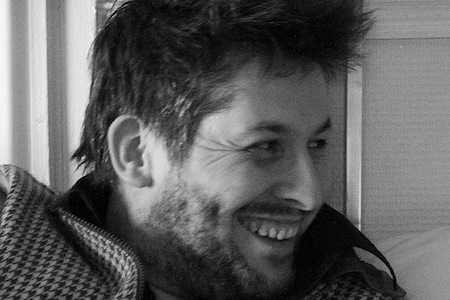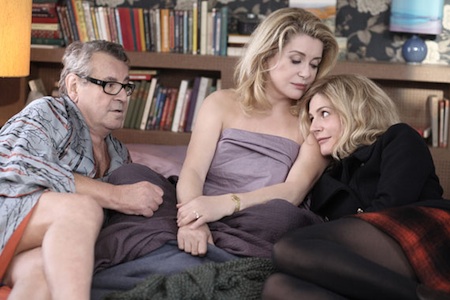“I am trying to invent new forms in which lightness and impurity are crucial,” states Christophe Honoré with the Gallic gift for epigrammatic finery. As filmmaking manifestos go, it’s admirably lofty yet also contradictory in practice, for Honoré’s lightness is often shaded with the unbearable, and his impurity immaculately rendered. Drawing on his background as a playwright, children’s book author and—in the storied tradition of Godard, Truffaut and other nouvelle vague forebears—critic for Cahiers du Cinéma, Honore debuted as a filmmaker ten years ago and has steadily established himself as a uniquely innovative and empathetic storyteller in features like Close to Leo and La Belle Personne.
With Beloved, which closed this year’s Cannes Film Festival and is currently in theatrical release, Honoré expands his vision. Starting in the mid-’60s and spanning five decades in the lives of a mother Madeleine and daughter Vera (played by real-life mere et fille Catherine Deneuve and Chiara Mastroianni, with Ludivine Sagnier as young Madeleine), who fall in and out of love in Paris, Prague and London, Beloved traverses European capitals and rugged emotional geography as its heroines grapple with complicated relationships (it’s a must-see for straight women who tend to fall for gay guys). The expansive time frame allows Honoré to chart the Russian invasion of Czechoslovakia, the liberation of the sexual revolution, the sobering reality of the AIDS crisis and the fallout of 9/11, all while maintaining the deft touch and nonjudgmental stance that have characterized all of his films
As in Honore’s earlier Love Songs, characters here express their deepest emotions and blasé asides through the words and music of Cesar-nominated composer Alex Beaupain, and further relate their longings through French versions of “These Boots Are Made for Walking,” “I Go to Sleep” and snatches of Morrissey lyrics. New Wave love songs have rarely sounded so wistful or wise.
Caught in the midst of a press juggernaut in New York City, Honoré shared his thoughts on his new film, the state of French cinema and the allure of a certain porn star via a spirited email exchange.
Keyframe: Beloved finds you working on quite an ambitious scale, in different countries and languages, and with multiple storylines and stylistic devices. Did you encounter new challenges this time around?
Christophe Honoré: I’m not sure if I can say this is my most ambitious film to date, but I do think it’s my weightiest. The budget was higher, and I worked on many more shoot locations and with several different crews. At the end of the day it could be quite frustrating, and often a painful challenge, as I found it very difficult to adapt my working methods to these foreign production crews. Usually I like to work in an almost documentary fashion, and for this film that wasn’t always possible.
Keyframe: You’ve always handled themes of love and relationships with a delicate touch, and your characters are often quite fluid in their sexuality. Beloved continues in this tradition, as you and your characters weigh the thrills and hazards of romance. It’s never as simple as boy meets girl—or boy—is it?
Honoré: Whether dealing with love or with sex, my characters are always surrounded by indecision. For them everything is possible but nothing is ever certain, and over the years I’ve realized that all my films speak about impermanence. I also wanted, with this movie, to attempt to understand what differentiates my generation from my parents’ generation. For them, love and the future were connected with hope, whereas for me, love and the future have been connected to fear. That’s a big difference in ideology, and I took it as the starting point for this screenplay. At the same time, I am wary of “film subjects,” and have no interest in using my films to convey a message. As an artist I have no message to convey. I’m more interested in feelings and in portraying the way we live.
Keyframe: As in Love Songs, here you once again harken back to the films of Jacques Demy and classic Hollywood musicals by having your characters burst into song. This has always seemed perfectly natural to me, in film and even in real life! We live through our music, as your characters do, whether Nancy Sinatra, the Kinks, the Smiths or Everything but the Girl. What are some of your favorite movie musicals?
Honoré: I have a preference for George Cukor and Vincente Minnelli’s musical comedies, but they belong to a specific era, the days of Hollywood splendor. That time no longer exists, which is why it can be difficult to avoid irony or nostalgia when taking on this genre. My musical films are not a continuation of this legacy, but more part of a French tradition of cinema that incorporates popular songs, as in certain films by Jean Renoir, François Truffaut and Jean Eustache. The songs in these films, and in mine, are not presented as performances; rather, they create a quality of introspection and intrigue. I’m far more interested in the songs moving rather than impressing viewers.
Keyframe: You’ve built up quite an extraordinary stock company, working numerous times with Louis Garrel, Chiara Mastroianni and Ludivine Sagnier. Do you write screenplays and specific characters with them in mind?
Honoré: I wrote Beloved for the three of them. First and foremost was my desire to work again with Chiara, and that led me to work with Catherine.
Keyframe: The magnificent Deneuve!
I was a little nervous about asking them to work together on a film, but they told me that they had dreamt a long time of sharing a set. Catherine said it was the easiest way for her to see her daughter every day! On set, Catherine was less the film legend than Chiara’s mother. Having worked with Chiara on several films, and being quite close to her personally and professionally, facilitated my working with Catherine. I allowed myself to approach her in a way that I might not have if Chiara not been there too. Working with them was easy and enriching. They are both great actresses, and in the end that is more important than them being mother and daughter.
Much of contemporary French cinema that is prized at home and abroad does not correspond to my taste, and I despair over many of the French films that are being distributed internationally today. I think that French cinema is going through a crisis, and I am dubious about its future. However, there are filmmakers that resist the mainstream and with whom I share key ideas of cinema. I feel a kinship with elders such as Arnaud Desplechin and Olivier Assayas, and with younger filmmakers such as Mia Hansen-Løve and Jean-Paul Civeyrac.
Keyframe: It’s wonderful to see Milos Forman here playing Deneuve’s main squeeze. His character’s name, Jaromil Passer, references two directors associated with the Czech New Wave of the mid-1960s, Jaromil Jires and Ivan Passer. Have these filmmakers influenced your work?
Honoré: I am regularly associated with the French New Wave, but I am even more of a Czech New Wave fan, particularly the films of Forman and Passer. I admire Forman’s career; he started out with clever little films produced in Europe and moved on to big intelligent movies realized in America. I love his audacity and the freedom with which desire navigates throughout his films.
Keyframe: Speaking of audacity and desire, you worked with gay porn icon François Sagat in your experimental narrative Man At Bath. Beyond my insatiable lust for him, I wonder what that working experience was like for you.
Honore: I think that all filmmakers are interested in porn films, whether or not they admit it. There is something in these movies that escapes us but that we grasp the importance of: the obscenity of the form. I was extremely happy working with Sagat. I enjoyed putting his clothes back on and finding a different way to render him vulnerable.
Keyframe: You’ve collaborated as a screenwriter with filmmakers such as Gaël Morel (Three Dancing Slaves, Après Lui) and Anne-Sophie Birot (Girls Can’t Swim), and in the past decade a number of similarly adventurous French directors have emerged on the international scene. Are you enthusiastic about the current state of French film?
Honoré: Much of contemporary French cinema that is prized at home and abroad does not correspond to my taste, and I despair over many of the French films that are being distributed internationally today. I think that French cinema is going through a crisis, and I am dubious about its future. However, there are filmmakers that resist the mainstream and with whom I share key ideas of cinema. I feel a kinship with elders such as Arnaud Desplechin and Olivier Assayas, and with younger filmmakers such as Mia Hansen-Løve and Jean-Paul Civeyrac.
I believe that I make films only because I watch the films of others. All of my films are responses or challenges to other filmmakers, notably those working in French cinema. I share the same actors, the same sets and even the same stories with other filmmakers. At the same time, each film is an opportunity for me to make a statement for French cinema.





